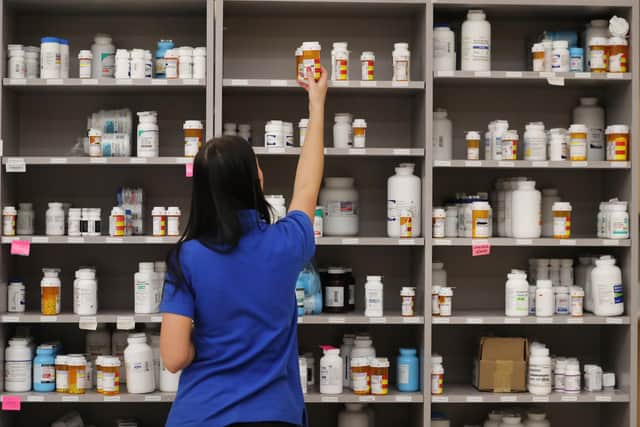Pharmacies should be allowed to expand capabilities to diagnose to ease pressure on GPs
and live on Freeview channel 276
Local pharmacies in England should be able to diagnose and treat a wider range of conditions, think tanks have suggested.
The move would help ease pressure on GPs, as currently, pharmacies can treat shingles, earache, sore throat, impetigo, infected insect bites, sinusitis and uncomplicated UTIs in women.
Advertisement
Hide AdAdvertisement
Hide AdA report by The King’s Fund and Nuffield Trust recommended services should expanded to include chickenpox so patients do not require a visit to the GP.


Pharmacies should also be able to refer patients directly to hospitals for scans and blood tests, the report said, and help manage long-term conditions such as hypertension or asthma.
The recommendations were made to policymakers in a bid to shape the future of how pharmacists provide care over the next decade, however, there are “significant” barriers to making this a reality, including a lack of investment.
The King’s Fund’s chief executive Richard Murray said: “Whilst our healthcare services may remain under significant pressure, this vision outlines an opportunity to invest in the future by maximising the potential of the experience and expertise held by community pharmacies.
Advertisement
Hide AdAdvertisement
Hide Ad“Expanding their role would help pharmacies to keep more people well, for example by supporting them to manage common long-term conditions without always needing to visit a GP, or by diagnosing and treating a wider range of minor conditions.”
The report also identified a number of barriers, such as a lack of investment in buildings, IT systems and staff across primary care, as well insufficient management capabilities and a lack of access to patient data.
In May, the government and NHS England announced a £645 million investment into pharmacies as part of the five-year Community Pharmacy Contractual Framework.
The Department of Health and Social Care (DHSC) said the cash would support the sector’s role in treating seven common conditions, as well as the expansion of oral contraception and blood pressure services.
Advertisement
Hide AdAdvertisement
Hide AdHowever, the King’s Fund and Nuffield Trust said the figure must rise if extra capacity is to be realised.
Nuffield Trust director of strategy Helen Buckingham said: “Community pharmacies have an exciting and important role to play in supporting patients to live healthy lives, get effective treatments quickly and navigate their health care.
“Many pharmacies are already doing this, but barriers exist at a national and local level to realising their full potential. This vision for community pharmacy illustrates the significant transformation we’ll see in pharmacy over the next decade.
“Given significant pressures on primary care, difficulties faced by patients to access health services quickly, the creation of ICSs, and a growing awareness of the potential of community pharmacy, now is the time to overcome these barriers that could prevent the vision from being implemented.”
Advertisement
Hide AdAdvertisement
Hide AdOther recommendations outlined in the report include legislative changes to allow pharmacies to dispense medicine without a pharmacist on site and for more investment in IT and data to allow pharmacies to access care records.
Mr Murray added: “For this vision to be realised will need determination and commitment not only from the NHS but also the community pharmacy sector itself.
“If community pharmacy steps up to seize these new opportunities then there will be benefits to their business and critically, they can provide better and more convenient access to health services for patients and the public.”
Janet Morrison, chief executive of Community Pharmacy England, which commissioned the report, said pharmacies are “critical to the health of the nation but there is still more that they could do for patients” with the right support.
Advertisement
Hide AdAdvertisement
Hide AdShe added the report “rightly” recognises that pressure on pharmacies must be eased.
“We want to empower pharmacies to reach their maximum potential, offering the full range of clinical services within their expanding skillset and becoming the true health and wellbeing hubs that local communities need,” Ms Morrison said.
“The pharmacies of tomorrow will have so much more to offer whether that is providing tests for lifestyle factors, help for people living with a long-term condition, or being a one-stop shop for a range of minor health conditions.
“The NHS of the future will need to look very different to the health systems of today which are creaking under pressure.”
Advertisement
Hide AdAdvertisement
Hide AdA DHSC spokesperson said: “Community pharmacies play a vital role in the NHS and already provide healthcare advice and support and we provide £2.6 billion every year to the sector.
“We have launched Pharmacy First, a national service backed by £645 million from the government, to enable community pharmacies to supply prescription-only medicines for seven common conditions without patients needing to see a GP and to support more blood pressure checks, which can pick up hypertension, and oral contraception consultations.
“Overall, we’re taking a long-term view on how we can improve the health service and our Major Conditions Strategy will look at the prevention and management of conditions, including dementia, cancer and diabetes, that are responsible for the highest proportion of ill health in England.”
Comment Guidelines
National World encourages reader discussion on our stories. User feedback, insights and back-and-forth exchanges add a rich layer of context to reporting. Please review our Community Guidelines before commenting.
